At dusk in Yakese, a village in Ghana’s resource-rich western region, farmers troop along a potholed road after a busy day harvesting cocoa, the fruits of their labour balanced in bowls on their heads.
“I have four children, but because the value of cocoa is falling in Ghana, I spend all my money on my children’s education,” says Okyeame Wange, 45, who has been farming in the area for the past 30 years, as a group of boys run past, chasing each other along narrow alleyways between mud-brick huts.
“We are the backbone of Ghana’s economy but our lives have not been transformed,” says Affuekeh Ekyae, 76, who has farmed cocoa in Adonikrom, another village in Ghana’s cocoa-producing western region, for 30 years. “Where is the profit?”
Ghana is the world’s second-largest cocoa exporter, producing an estimated output of 930,000 tonnes last season, according to Ecobank. The country’s cocoa sector makes up about 15% of GDP, with smallholder farmers comprising about 85% of the industry, according to Ghana’s state-run cocoa marketing board, Cocobod.
But Ghana, hailed until recently for its strong economic growth, is now struggling, which led to demonstrations in the capital Accra last month over government corruption and the depreciating worth of the cedi, which has lost as much as 40% of its value against the dollar.
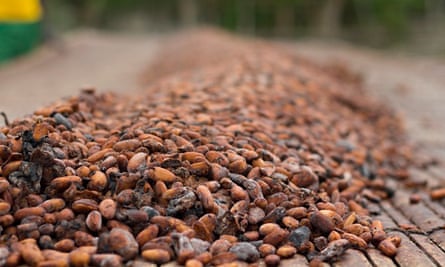
Ghana’s economic woes have hurt farmers, who say basic operational costs, including the price of fertiliser, have risen sharply over the past three years. Despite this, Cocobod has not increased the price it pays for cocoa – farmers still receive 212 cedis (£36.63) for a 64kg bag.
“The government should increase the price it pays farmers for their cocoa,” says Enchi district commander Oscar Ofori Larbi, who oversees one of the most active cocoa regions in Ghana. “That would solve many of the problems here.”
Ghana’s ruling National Democratic Congress party said in its manifesto that Cocobod would “strive to pay the cocoa farmer at least 70% of the world market price of cocoa”, as well as cover the cost of pest control, and improving roads and production methods.
But farmers in the region say they are receiving little help from the government, and, with rising production costs, they are borrowing heavily from credit unions to stay in business.
Ekyae says the government provides only two of the 120 bottles of fertiliser he needs to cover his 1 hectare (2.52 acre) plot. The price of fertiliser has more than doubled to 55 cedis per bottle from 25 cedis in 2010, he says. “I spend 6,490 cedis per year to fertilise my land, which I need to do to produce more cocoa.”
Noah Kwasi Amenyah, public relations officer of Cocobod, says fertiliser is free for the farmers, but adds: “I would accept that certain farmers may not be covered by this programme to give out free fertiliser because it is in the first year of implementation. As we go along all these kinks will be ironed out.”
Under Ghanaian law, farmers are only allowed to sell their beans to purchasing clerks who act as intermediaries between them and Cocobod. Ghana’s low cocoa prices and the depreciation of the cedi has led some farmers and purchasing clerks to smuggle their beans into neighbouring Ivory Coast (pdf), the world’s largest cocoa exporter.
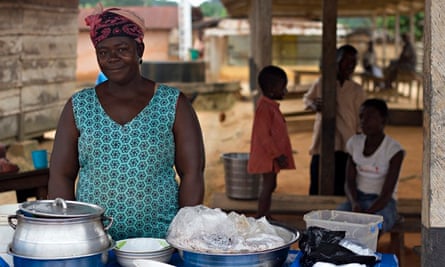
“Farmers call me and they tell me that smuggling is happening,” says Emmanuel Arthur, managing director of Kuapa Kokoo, a cocoa farmers’ union. “Purchasing clerks tell me they can’t find cocoa to buy because Ghanaian farmers have sold to Ivorian traders. Somebody called me and told me that a sack of cocoa can be sold in Ivory Coast for 350 cedis, but it is sold at 212 cedis in Ghana,” he says. “That is very attractive for farmers.”
But Amenyah played down the scale of the smuggling. “The hue and cry of cocoa moving from Ghana to Cote d’Ivoire may not be as alarming as it has been reported,” he says, pointing to Ghana’s 15% increase in cocoa output this year, compared with the 10% rise in Ivory Coast.
In recent months Enchi’s anti-smuggling taskforce has boosted its efforts to curb illegal cross-border trading. Nearly 300 bags were seized in the Aowin-Suaman district between May and June. But the taskforce is poorly resourced.
At an outpost only 20km from the Ivory Coast border, Kojo Daapa, whose family own many of the cocoa plantations in the town of Daapakrom, known locally as No Problem, says he does not smuggle cocoa, but he has seen traders pass by on their way to the border.
“It’s a two-way business; some years ago cocoa was coming in from Ivory Coast,” he says. “Our borders are so porous.”
In his office overlooking downtown Accra, Amenyah dismisses the suggestion that Ghana’s economic problems are encouraging cocoa smuggling. “The entire country is unhappy with what is happening to our currency,” he says. “For now, I can say we will certainly review the price of cocoa.”
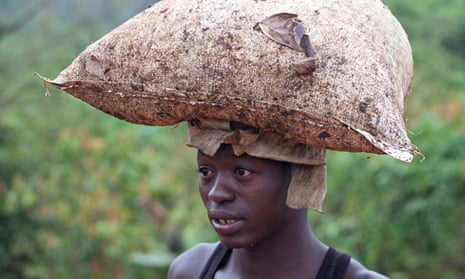

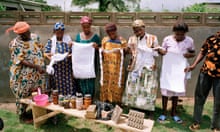

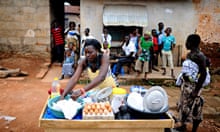
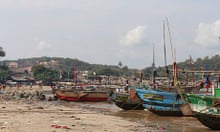

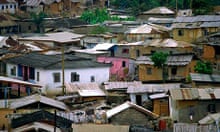
Comments (…)
Sign in or create your Guardian account to join the discussion